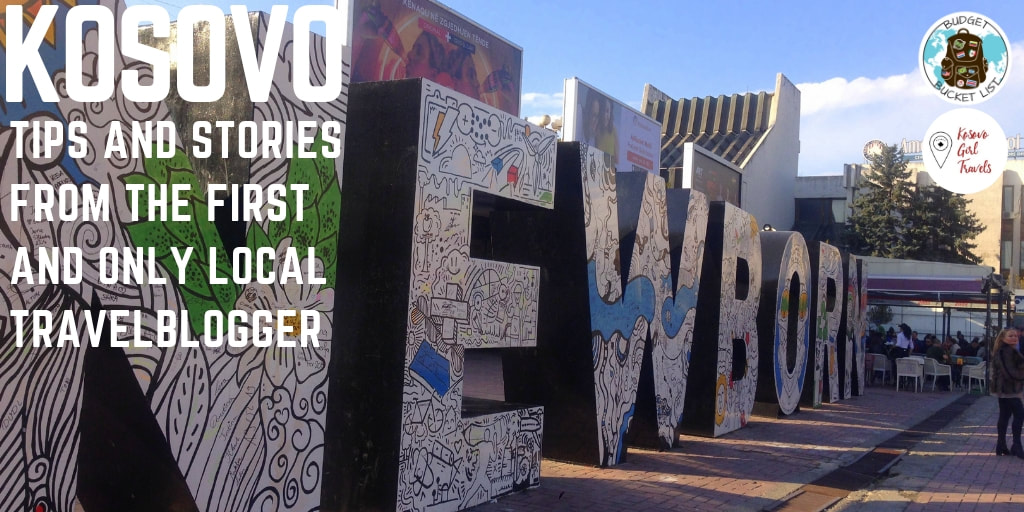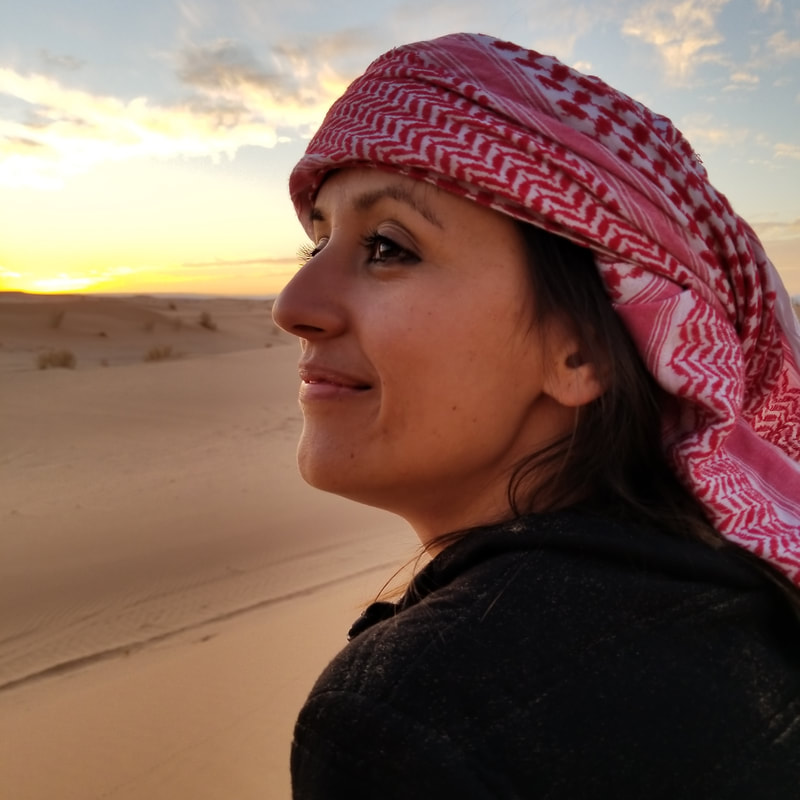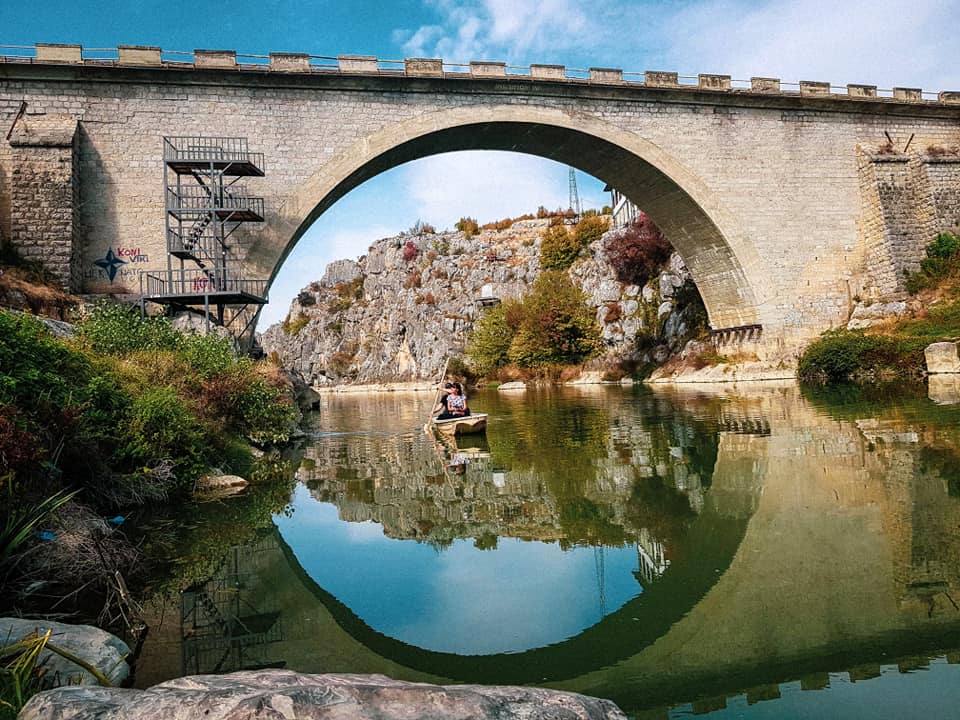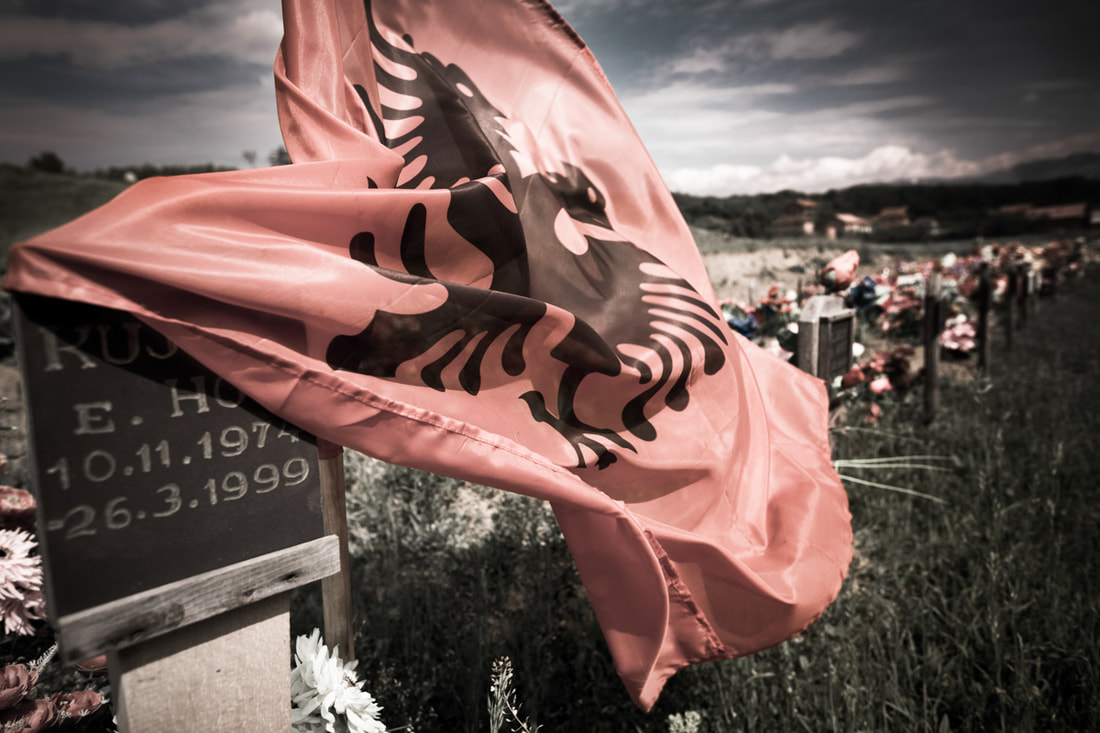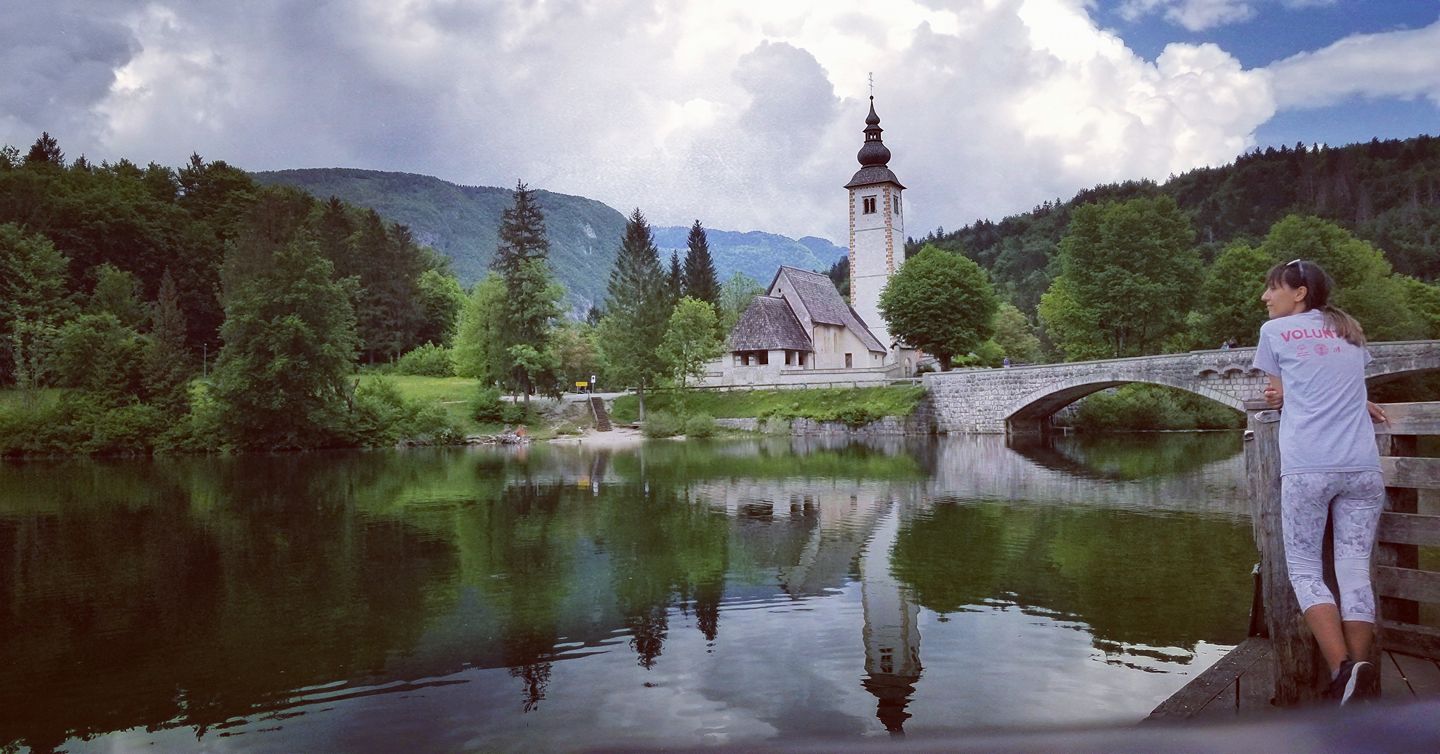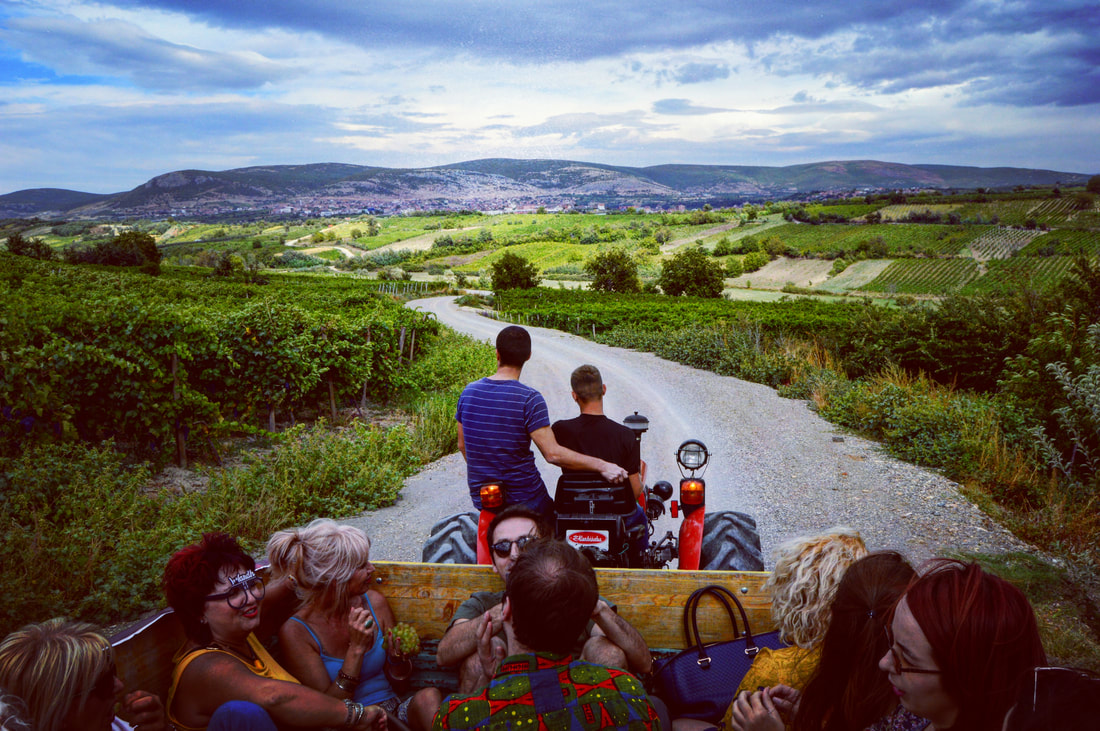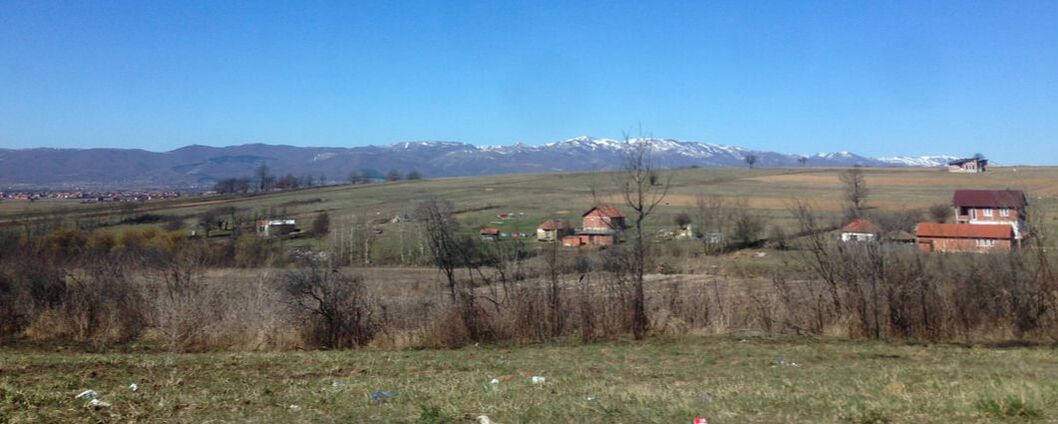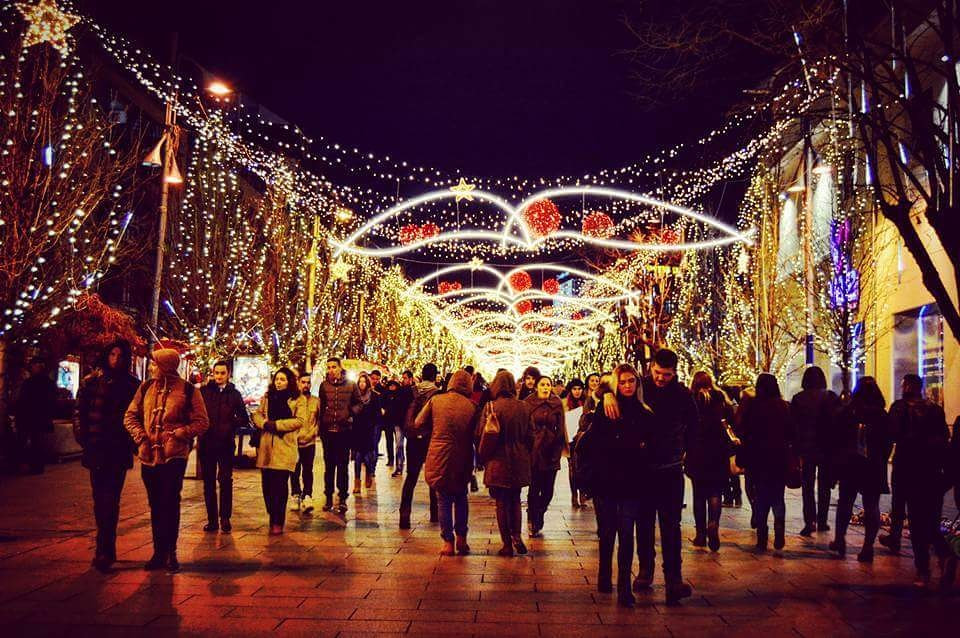Guest Blog: 'Kosovo Girl Travels'
|
Lavdi is a passionate traveller roaming the planet with a Kosovo passport. She visited 36 countries and lived on 3 continents. In her travelblog ‘Kosovo Girl Travels’ she writes about the adventures and complications of travelling with a nationality that’s still new to the world, and shares valuable tips and advices for globetrotters visiting her home country Kosovo.
Today she speaks with Budget Bucket List about her childhood as an Albanian Kosovar in a conflict-ridden area, her love for her country and her desire to see the world [and the complexities that brings]. Scroll down for an extensive Kosovo Travel FAQ, put together by this experienced local. |
Kosovo still seems to be either a mystery to people I meet during my travels, or a war-torn area somewhere ‘in Russia’…
Lately some even confuse it with Bosnia somehow (?). However, my country is located in Southeast Europe and borders with Albania, Montenegro, Serbia, and the Republic of North Macedonia. [This description could trigger the Serbs who don’t recognize Kosovo, or the Macedonians who don’t like the new name but, hey, what can I do].
Kosovo is a small, landlocked country with a surface of only 11.000 square kilometers. That said, it has a rich history. After 9 years of international ruling and enduring the rough times of the Kosovo War (1998-1999), Kosovo declared its independence in 2008, which was officially completed in 2012. However, even 20 years after the war, 11 years after the declaration of independence, and despite being located on the European continent, Kosovo citizens still need to apply for a Schengen visa to travel within the European Union and can only freely travel to 47 countries (visa-free or visa-on-arrival; this might change over time and needs to be confirmed with each country separately).
Lately some even confuse it with Bosnia somehow (?). However, my country is located in Southeast Europe and borders with Albania, Montenegro, Serbia, and the Republic of North Macedonia. [This description could trigger the Serbs who don’t recognize Kosovo, or the Macedonians who don’t like the new name but, hey, what can I do].
Kosovo is a small, landlocked country with a surface of only 11.000 square kilometers. That said, it has a rich history. After 9 years of international ruling and enduring the rough times of the Kosovo War (1998-1999), Kosovo declared its independence in 2008, which was officially completed in 2012. However, even 20 years after the war, 11 years after the declaration of independence, and despite being located on the European continent, Kosovo citizens still need to apply for a Schengen visa to travel within the European Union and can only freely travel to 47 countries (visa-free or visa-on-arrival; this might change over time and needs to be confirmed with each country separately).
Too busy to read now? No problem, save it for later!
Save on Get Pocket | Save in Browser Bookmarks| Save on Instapaper
Save on Get Pocket | Save in Browser Bookmarks| Save on Instapaper
My Childhood in Kosovo
The history of Kosovo is told differently by different sources. It all depends on who you are talking to and how the person has been brought up. I was born in an ethnic Albanian family and raised to love my country and dream of being one with Albania. My family always told me how we were separated from Albania in 1913. Then, later on during the ‘90ies, I had to personally live through the war.
When I was a kid the occupation of Kosovo didn’t have a big impact on me, as I really didn’t understand much of it yet. I lived in an Albanian neighbourhood, went to an Albanian school, and my dad was working and providing for our family; everything seemed okay and normal. It only started to change when Albanian schools stopped being funded by the government. As a result, school children were asked to provide money for all kind of necessities and teachers were working without any compensation. Later on, when a war broke out in the Drenica region and the Internally Displaced Persons* came to our city (which was still not at war but a tense vibe was spreading), I started to understand and feel the occupation more and more.**
* IDP - at the time I called them ‘refugees’ as I wasn’t aware of this term.
** I’ve talked about my experience as an IDP here. To be honest, it wasn’t easy and it’s still not easy to go through those memories.
The history of Kosovo is told differently by different sources. It all depends on who you are talking to and how the person has been brought up. I was born in an ethnic Albanian family and raised to love my country and dream of being one with Albania. My family always told me how we were separated from Albania in 1913. Then, later on during the ‘90ies, I had to personally live through the war.
When I was a kid the occupation of Kosovo didn’t have a big impact on me, as I really didn’t understand much of it yet. I lived in an Albanian neighbourhood, went to an Albanian school, and my dad was working and providing for our family; everything seemed okay and normal. It only started to change when Albanian schools stopped being funded by the government. As a result, school children were asked to provide money for all kind of necessities and teachers were working without any compensation. Later on, when a war broke out in the Drenica region and the Internally Displaced Persons* came to our city (which was still not at war but a tense vibe was spreading), I started to understand and feel the occupation more and more.**
* IDP - at the time I called them ‘refugees’ as I wasn’t aware of this term.
** I’ve talked about my experience as an IDP here. To be honest, it wasn’t easy and it’s still not easy to go through those memories.
Living a war
I believe that having gone through war has made me more compassionate towards people going through the same situation, anytime and anywhere in the world. Also, during the war it was amazing how people became like one big family. We shared everything, we were together ‘in good and bad’ and there was this feeling of community that has since (almost) disappeared.
At the same time I found it incomprehensible that I, as an 11-year-old child, had to fear for my life without knowing the reason I was being hated. I have a memory of me and my father riding a bicycle to go grocery shopping at the market, passing the police station. The sun was shining bright and shone directly into my eyes, which was hurting me… but I was too afraid to close my eyes, as it was war time and the police’s reaction was unforeseeable.
I believe that having gone through war has made me more compassionate towards people going through the same situation, anytime and anywhere in the world. Also, during the war it was amazing how people became like one big family. We shared everything, we were together ‘in good and bad’ and there was this feeling of community that has since (almost) disappeared.
At the same time I found it incomprehensible that I, as an 11-year-old child, had to fear for my life without knowing the reason I was being hated. I have a memory of me and my father riding a bicycle to go grocery shopping at the market, passing the police station. The sun was shining bright and shone directly into my eyes, which was hurting me… but I was too afraid to close my eyes, as it was war time and the police’s reaction was unforeseeable.
Photo Credits
I Love Kosovo, I Love the World
I love that my country is small and well-connected with its neighbours. In a few hours one can reach the beautiful beaches of Albania or in even less travel time it’s possible to visit Kosovo’s stunning mountains, perfect for hiking and skiing. I like that everyone is so hospitable and friendly, in particular towards foreigners, and that they’d go above and beyond to make someone feel ‘at home’.
As a child I’ve read a lot of books and many times I fell asleep while reading, dreaming about the destinations I’ve read about. I believe that’s where I got the travel bug initially. Through books I could travel to different worlds, both fictive and real, and gradually that desire for getting to know and experience more started to build up. A true eye-opener was my first international journey (to France), during which I could feel what it’s like to meet people from a wide variety of nationalities, making me realize how small the place is that I occupy and how much more there is in the world to see. Many more trips followed, both within Europe and in the USA, internalizing travel within my heart. I cannot stop.
Realizing how difficult it is to find information on Kosovo (with regards to travelling in Kosovo as a foreigner, as well as for a Kosovar to travel abroad), I decided to fill in that gap and provide local information on this relatively undiscovered country via my travelblog Kosovo Girl Travels.
I Love Kosovo, I Love the World
I love that my country is small and well-connected with its neighbours. In a few hours one can reach the beautiful beaches of Albania or in even less travel time it’s possible to visit Kosovo’s stunning mountains, perfect for hiking and skiing. I like that everyone is so hospitable and friendly, in particular towards foreigners, and that they’d go above and beyond to make someone feel ‘at home’.
As a child I’ve read a lot of books and many times I fell asleep while reading, dreaming about the destinations I’ve read about. I believe that’s where I got the travel bug initially. Through books I could travel to different worlds, both fictive and real, and gradually that desire for getting to know and experience more started to build up. A true eye-opener was my first international journey (to France), during which I could feel what it’s like to meet people from a wide variety of nationalities, making me realize how small the place is that I occupy and how much more there is in the world to see. Many more trips followed, both within Europe and in the USA, internalizing travel within my heart. I cannot stop.
Realizing how difficult it is to find information on Kosovo (with regards to travelling in Kosovo as a foreigner, as well as for a Kosovar to travel abroad), I decided to fill in that gap and provide local information on this relatively undiscovered country via my travelblog Kosovo Girl Travels.
A Travelling Kosovar
There are two big journeys I’ve made so far. The first one was moving to Chicago where I spent about 2 years, optimizing every opportunity to travel within the USA as well as to surrounding countries such as the Dominican Republic, Haiti, Mexico and Puerto Rico. The second one is when I moved to South Sudan, which was an entirely different world from what I previously knew. During the 6 months I spent here (visiting several places in Africa), I thoroughly enjoyed the sharp differences: Good people as well as bad ones; wonderful places alternating with very dirty ones; amazing food as well as rather unusual dishes. Other (shorter) solo trips that stood out where my journeys to Thailand and Jordan, as well as my recent trips to Djibouti and Ethiopia, which are absolutely fantastic destinations.
However, travelling on a Kosovo passport isn’t an easy thing to do…
Not only do I experience many limitations when it comes to the countries I can freely travel to, I also experience mixed reactions from people I meet during my travels. There are countries I simply cannot visit (such as India / Cuba / South-Africa), and there are cases when I’ve tried to check-in online for a flight but the airlines didn’t have my country in their list of options. Ironically, often I did found Yugoslavia, which doesn’t exist for decades now. One time my nationality on purchased boat tickets was listed as the ‘Russian Federation’, which was really the worst country they could have possibly picked (why not Albania?). Another time I tried to return home through Serbia and almost got stuck there as the airplane employees were unwilling to let me travel without a Serbian visa (are you kidding me?). Frequently the immigration process takes longer for me, as Kosovo might not be in their standard country list or it’s their first time ever to see a Kosovo passport, which triggers extra questions and curiosity. It feels good and bad to be the first Kosovo citizen an immigration officer sees... On the downside it means Kosovo citizens aren’t travelling that much (yet), but on the bright side I’m paving the way for the ones who will.
There are two big journeys I’ve made so far. The first one was moving to Chicago where I spent about 2 years, optimizing every opportunity to travel within the USA as well as to surrounding countries such as the Dominican Republic, Haiti, Mexico and Puerto Rico. The second one is when I moved to South Sudan, which was an entirely different world from what I previously knew. During the 6 months I spent here (visiting several places in Africa), I thoroughly enjoyed the sharp differences: Good people as well as bad ones; wonderful places alternating with very dirty ones; amazing food as well as rather unusual dishes. Other (shorter) solo trips that stood out where my journeys to Thailand and Jordan, as well as my recent trips to Djibouti and Ethiopia, which are absolutely fantastic destinations.
However, travelling on a Kosovo passport isn’t an easy thing to do…
Not only do I experience many limitations when it comes to the countries I can freely travel to, I also experience mixed reactions from people I meet during my travels. There are countries I simply cannot visit (such as India / Cuba / South-Africa), and there are cases when I’ve tried to check-in online for a flight but the airlines didn’t have my country in their list of options. Ironically, often I did found Yugoslavia, which doesn’t exist for decades now. One time my nationality on purchased boat tickets was listed as the ‘Russian Federation’, which was really the worst country they could have possibly picked (why not Albania?). Another time I tried to return home through Serbia and almost got stuck there as the airplane employees were unwilling to let me travel without a Serbian visa (are you kidding me?). Frequently the immigration process takes longer for me, as Kosovo might not be in their standard country list or it’s their first time ever to see a Kosovo passport, which triggers extra questions and curiosity. It feels good and bad to be the first Kosovo citizen an immigration officer sees... On the downside it means Kosovo citizens aren’t travelling that much (yet), but on the bright side I’m paving the way for the ones who will.
During my travels, I met many people who know nothing about Kosovo and I have to start from zero and explain everything. I met people who have heard something about it in 1999 but without any follow-up, so I have to explain I don’t actually live in a war zone (since a very long time). In fact, it’s very safe and we have everything Western Europe has - mobile phones, internet, good restaurants and asphalt roads (all but job opportunities that aren’t in call centres and shopping centres). I’ve met people from Serbia who ran away or pretended they know nothing about my country. However, I’ve also met people who know someone from Kosovo or have been there themselves and were passionate and willing to know more. Negative experiences always offset the positive ones.
Kosovo = Home
I love travelling, but I love returning to my home as well. Being back in my bed, my room and my comfort zone is a wonderful feeling to experience after some time abroad. Sometimes I’d like to ‘play the tourist’ in my own beautiful country, but I learned that’s quite a difficult thing to do. It feels weird to take pictures of my own everyday life or go sightseeing in a place I know so well…
… so let me help you, a traveller in Kosovo, on the way:
Kosovo = Home
I love travelling, but I love returning to my home as well. Being back in my bed, my room and my comfort zone is a wonderful feeling to experience after some time abroad. Sometimes I’d like to ‘play the tourist’ in my own beautiful country, but I learned that’s quite a difficult thing to do. It feels weird to take pictures of my own everyday life or go sightseeing in a place I know so well…
… so let me help you, a traveller in Kosovo, on the way:
Kosovo FAQ
Is it safe to visit Kosovo? I mean after the war and all the tensions…
The war happened about 20 years ago and things have moved on since. Generally, you don’t see many signs of it as almost everything was rebuilt soon after the war was over, and the millions of refugees have returned to their countries. Nowadays, Kosovo is among the safest places in Europe. This doesn’t mean you should let your guard down, just like you shouldn’t anywhere else in the world. Many of my traveller-friends have told me about their hitchhiking experiences in Kosovo, or about invitations to people’s homes for drinks or dinner… if that doesn’t sound safe to you, then maybe you shouldn’t consider leaving your bedroom at all (just stay there and use Google Maps to see the world ;)).
I’ve heard I cannot visit Serbia after having a Kosovo stamp on my passport. Is it true?
Serbia doesn’t recognize Kosovo (yet) and that’s why trying to enter Serbia from Kosovo is considered illegal by their authorities. However, this doesn’t mean you will never be able to visit Serbia, opposed to what some people claim on internet forums. It just means you’ll have to waste an extra couple of hours going there through North Macedonia or Montenegro. An exception is valid for EU citizens holding biometric IDs which can be used instead of a passport when entering Serbia.
Check out what other stuff you should know before coming to Kosovo in this article.
Is it safe to visit Kosovo? I mean after the war and all the tensions…
The war happened about 20 years ago and things have moved on since. Generally, you don’t see many signs of it as almost everything was rebuilt soon after the war was over, and the millions of refugees have returned to their countries. Nowadays, Kosovo is among the safest places in Europe. This doesn’t mean you should let your guard down, just like you shouldn’t anywhere else in the world. Many of my traveller-friends have told me about their hitchhiking experiences in Kosovo, or about invitations to people’s homes for drinks or dinner… if that doesn’t sound safe to you, then maybe you shouldn’t consider leaving your bedroom at all (just stay there and use Google Maps to see the world ;)).
I’ve heard I cannot visit Serbia after having a Kosovo stamp on my passport. Is it true?
Serbia doesn’t recognize Kosovo (yet) and that’s why trying to enter Serbia from Kosovo is considered illegal by their authorities. However, this doesn’t mean you will never be able to visit Serbia, opposed to what some people claim on internet forums. It just means you’ll have to waste an extra couple of hours going there through North Macedonia or Montenegro. An exception is valid for EU citizens holding biometric IDs which can be used instead of a passport when entering Serbia.
Check out what other stuff you should know before coming to Kosovo in this article.
You can travel Serbia-Kosovo-Serbia as according to the Serbian Immigration you’ve never left Serbia. This is what you see right after the Serbia-Kosovo border.
I’ve read Kosovo is a Muslim-majority country. What’s the appropriate dress code for women?
I wouldn’t recommend walking around Pristina in your bikini, but you can wear anything you’d also wear in non-Islamic countries such as Germany or the USA.
Read more about this subject in this article.
Why do Albanian Kosovars use the Albanian flag as well, and what does the Kosovo flag mean?
The Albanian flag is considered the national flag of Albanians wherever they live (North Macedonia, Serbia, Montenegro, Greece) and that’s why you will see a lot of Albanian flags throughout Kosovo. 28 November, the Independence Day of Albania or the National Flag Day, is still widely celebrated in Kosovo and on this day the main city squares are decorated with Albanian flags. The Kosovo flag was introduced to its citizens without asking for their opinion or consent. The stars in the flag are said to represent the communities in Kosovo recognized by the Constitution.
What language is spoken in Kosovo? Will I be okay if I only know English?
First of all, try to learn another language for your own benefit. Just kidding, you’re okay with just English. The official languages in Kosovo are Albanian and Serbian. However, in most of the places you’ll find menus in English and waiters speak English as well. If they don’t, they’ll find someone who does to still help you out. In case they don’t know English, try German if you can, as that’s also pretty common.
Is Kosovo expensive?
Kosovo is very affordable in all regards. Expect to pay €1,50 for a beer, €5 for a meal or bus ticket (although hitchhiking is quite easy here as well!) and €10-15 for a bed. Lots of sights such as museums, old ruins, castles and monasteries are free or cost close to nothing to visit.
Check this article for more info.
I’ve read Kosovo is a Muslim-majority country. What’s the appropriate dress code for women?
I wouldn’t recommend walking around Pristina in your bikini, but you can wear anything you’d also wear in non-Islamic countries such as Germany or the USA.
Read more about this subject in this article.
Why do Albanian Kosovars use the Albanian flag as well, and what does the Kosovo flag mean?
The Albanian flag is considered the national flag of Albanians wherever they live (North Macedonia, Serbia, Montenegro, Greece) and that’s why you will see a lot of Albanian flags throughout Kosovo. 28 November, the Independence Day of Albania or the National Flag Day, is still widely celebrated in Kosovo and on this day the main city squares are decorated with Albanian flags. The Kosovo flag was introduced to its citizens without asking for their opinion or consent. The stars in the flag are said to represent the communities in Kosovo recognized by the Constitution.
What language is spoken in Kosovo? Will I be okay if I only know English?
First of all, try to learn another language for your own benefit. Just kidding, you’re okay with just English. The official languages in Kosovo are Albanian and Serbian. However, in most of the places you’ll find menus in English and waiters speak English as well. If they don’t, they’ll find someone who does to still help you out. In case they don’t know English, try German if you can, as that’s also pretty common.
Is Kosovo expensive?
Kosovo is very affordable in all regards. Expect to pay €1,50 for a beer, €5 for a meal or bus ticket (although hitchhiking is quite easy here as well!) and €10-15 for a bed. Lots of sights such as museums, old ruins, castles and monasteries are free or cost close to nothing to visit.
Check this article for more info.
Some destinations are warding off tourists nowadays. Is Kosovo the same?
Not at all. Tourism in Kosovo is strongly developing in the recent years and generally locals love seeing tourists in their city. If you notice someone looking at you inquisitively , it’s probably because they wonder why tourists are visiting when they want to leave (it’s still not a high percentage compared to the neighbouring countries, but many young people think they’d have a better life abroad). You might be asked rather personal questions that can be culturally unacceptable in the country you come from, such as: How old are you? What do you do? Are you married? How do you afford to travel? Etc. If you’re an American prepare to be asked about Trump. If you’re Spanish prepare to be asked why your country doesn’t recognize Kosovo and doesn’t even let us visit Spain legally.
What are the highlights of Kosovo?
First of all, make sure you take the opportunity to spend time with the very hospitable local people that place the guest at the centre of their attention. For hiking and/or camping I recommend the beautiful, pristine mountains of our country, which also make a perfect spot for skiing in winter. Don’t miss out on the lovely waterfall in Mirusha and the Drini Canyon in Gjakova! Include the beautiful historical town if Prizren into your visit and experience the vibrant nightlife of Pristina.
More tips can be found in this article.
Not at all. Tourism in Kosovo is strongly developing in the recent years and generally locals love seeing tourists in their city. If you notice someone looking at you inquisitively , it’s probably because they wonder why tourists are visiting when they want to leave (it’s still not a high percentage compared to the neighbouring countries, but many young people think they’d have a better life abroad). You might be asked rather personal questions that can be culturally unacceptable in the country you come from, such as: How old are you? What do you do? Are you married? How do you afford to travel? Etc. If you’re an American prepare to be asked about Trump. If you’re Spanish prepare to be asked why your country doesn’t recognize Kosovo and doesn’t even let us visit Spain legally.
What are the highlights of Kosovo?
First of all, make sure you take the opportunity to spend time with the very hospitable local people that place the guest at the centre of their attention. For hiking and/or camping I recommend the beautiful, pristine mountains of our country, which also make a perfect spot for skiing in winter. Don’t miss out on the lovely waterfall in Mirusha and the Drini Canyon in Gjakova! Include the beautiful historical town if Prizren into your visit and experience the vibrant nightlife of Pristina.
More tips can be found in this article.
For budget tips & compact place-specific travel info... Download Budget Bucket List's FREE Budget Fact Sheets. You're welcome.
| Download Steph's PRISTINA Quick Budget Fact Sheet | |
| File Size: | 1083 kb |
| File Type: | |
In order to support the travelers’ community, I spend many hours per week to adequately document all information and advices for prospective visitors, accompanied by a (hopefully) entertaining insight into my personal observations and experiences. This service is and will remain free. However, if you voluntarily want to make a contribution and support my travels and thus the creation of new stories and information supply, here is the button you’re looking for:
Related:
- Kosovo through the eyes of a traveller: a hitchhiker in Pristina
- Continue your Kosovo-itinerary: Explore Prizren!
- Get your Albania itinerary ready: Berat, Gjirokastër, Korcë / Ohrid Lake, Theth, Shkodër, Tirana, Mount Korab & the coast!
- Budget Bucket List on invitation in the DMZ Zone, North Korea
- Curious what I encountered during a 2-month hitchhiking trip through Romania?
- Europe's best skiing & hiking: Get your ass over to jaw-dropping Switzerland!
- Be about Bulgaria: Check off Bansko, Belogradchik, Plovdiv, Sofia and of course Veliko Tarnovo!
- Experience the bright and dark side of Vienna [Austria]
- German gems: Aachen & Frankfurt am Main
- German gems: Aachen & Frankfurt am Main
- Citytripping in Copenhagen [Denmark]
- Modern ventures in Frankfurt am Main [Germany]
- Top-5 places to visit in South Limburg [The Netherlands]
- Discover more Belgium: Antwerp & the most kick-ass Flanders itinerary!
- Visit Balkan's finest: Montenegro's National Parks Blog, Kotor Bay & Lovcen NP and Cetinje, Durmitor NP, Podgorica, Prokletije NP and Montenegro's Coastal Towns Blog
- Witness the many faces of Lithuania within the city of Vilnius
- Read about Bosnia & Herzegovina: Mostar, Blagaj, Trebinje, Sarajevo, Jajce, Banja Luka and Sutjeska National Park (incl. Maglic Peak - the country's highest!)
- Volunteering experiences in the slums of Honduras
- Getting hospitalized in a country without health care & gang violence: Dark times in El Salvador
- Jordan, a destination on the rise: Extensive guides to Petra, Amman and Wadi Rum
- 10 things you can't do in the non-touristy part of Morocco
- Kosovo through the eyes of a traveller: a hitchhiker in Pristina
- Continue your Kosovo-itinerary: Explore Prizren!
- Get your Albania itinerary ready: Berat, Gjirokastër, Korcë / Ohrid Lake, Theth, Shkodër, Tirana, Mount Korab & the coast!
- Budget Bucket List on invitation in the DMZ Zone, North Korea
- Curious what I encountered during a 2-month hitchhiking trip through Romania?
- Europe's best skiing & hiking: Get your ass over to jaw-dropping Switzerland!
- Be about Bulgaria: Check off Bansko, Belogradchik, Plovdiv, Sofia and of course Veliko Tarnovo!
- Experience the bright and dark side of Vienna [Austria]
- German gems: Aachen & Frankfurt am Main
- German gems: Aachen & Frankfurt am Main
- Citytripping in Copenhagen [Denmark]
- Modern ventures in Frankfurt am Main [Germany]
- Top-5 places to visit in South Limburg [The Netherlands]
- Discover more Belgium: Antwerp & the most kick-ass Flanders itinerary!
- Visit Balkan's finest: Montenegro's National Parks Blog, Kotor Bay & Lovcen NP and Cetinje, Durmitor NP, Podgorica, Prokletije NP and Montenegro's Coastal Towns Blog
- Witness the many faces of Lithuania within the city of Vilnius
- Read about Bosnia & Herzegovina: Mostar, Blagaj, Trebinje, Sarajevo, Jajce, Banja Luka and Sutjeska National Park (incl. Maglic Peak - the country's highest!)
- Volunteering experiences in the slums of Honduras
- Getting hospitalized in a country without health care & gang violence: Dark times in El Salvador
- Jordan, a destination on the rise: Extensive guides to Petra, Amman and Wadi Rum
- 10 things you can't do in the non-touristy part of Morocco
